No Salespeople – No Deposit – Free Insurance

Posted onTrustindex verifies that the original source of the review is Google. The whole process was incredibly smooth - from registration and quotation to installation and follow-up. Their pricing is very competitive, and they take care of everything, including DNO submission, MCS certification, and paperwork for SEG. Installation was carried out with care and professionalism. The workmanship is excellent, and the long warranties give real peace of mind. If you're considering solar, I’d highly recommend UPS Solar for a hassle-free experience.Posted onTrustindex verifies that the original source of the review is Google. What a fantastic service and company, can't rate UPS Solar highly enough. We were contacted by our local council regarding a group solar power installation procurement, the council would do the hard yards finding the best company and, if we wanted to proceed, would put us in contact with them. Almost 1 month to the day we were told UPS Solar were the company we now have a shiny solar panels and battery installed. The communication has been top drawer from the survey to the proposal and the install, UPS Solar took the time to go through any questions or concerns. The scaffolding was erected and the install team arrived a few days later. They started around 0800 and by lunchtime everything was sorted, power flowing and rubbish taken away. UPS Solar then sent through instructions for connecting up to the app to see how everything is working and then a few days later all the certs were emailed across. The day after install the scaffold company arrived and removed the scaffolding. Super efficient. As you are probably aware by now, I can't rate UPS Solar highly enough, great company and seriously know what they are doing. You won't go far wrong.Posted onTrustindex verifies that the original source of the review is Google. Good overall experience. System was installed professionally and cleanly. The only slight niggle was a lack of notice for the scaffolders turning up which didn't help with planning, but that's a minor gripe.Posted onTrustindex verifies that the original source of the review is Google. UPS fitted a replacement Solar inverter for me. Great response to get a good and competitive replacement and a speedy install. They even set up my phone to monitor the system. Excellent service.Posted onTrustindex verifies that the original source of the review is Google. Highly recommend them.I asked few quotes from companies then compared them and their offer was the better with 17 panels and 15kw battery.They were very helpful from the beggining till the end.They were on time with scaffold and instalation too.Made professional job no mess,cleaned up after they finished.Explained everything if I had any question during instalation.The system works better like we expected.Posted onTrustindex verifies that the original source of the review is Google. i had a great experience Price was great alot of other company tried to overcharge for same system Service over the phone is great they answer all your questions The dno process was really fast The installers did a really good and tidy job covered and hide the cables everything looks nice and presentable Great after sales all documents come through fast and they monitor your sistem for any issues after install They have all the certificate for you to sell your energy after having a install from them and they provide with a good warranty So no complainsPosted onTrustindex verifies that the original source of the review is Google. UPS SLOAR INSTALLATION TEAM WAS VERY PROFESSIONAL AND HAVE DONE A FANTASTIC JOB! Everything was explained at each step. Phil and Martin are very knowledgable.Posted onTrustindex verifies that the original source of the review is Google. A very professional and efficient team. We were contacted by Alan who provided an initial quote, and was very informative and patient with my many questions. After some research we found the pricing very competitive, but we found them far more helpful and responsive than others we had contacted. The whole team we have dealt with we helpful and efficient. The whole job was completed from initial contact to finish in a little over a month and that was with some delays on our part. I cannot recommend them enough. Super service. Thank you all at UPS.Posted onTrustindex verifies that the original source of the review is Google. Excellent Company to deal with!! No pushy Sales people harassing with last minute deals or discounts The original survey and quote was done via Satellite imagery. When we expressed an interest a surveyor called to check the positioning of the panels of equipment. Ha also suggested we install a Water heater boost which diverts spare Solar power to the immersion heater. With the bright weather not only has the Solar met all our needs but additionally we have sold some back to the grid. The installation team were friendly efficient and very competent.fitted 3 batteries and 12 panels in the day. Scaffolding was removed immediatelyPosted onTrustindex verifies that the original source of the review is Google. UPS Solar have dealt with us in a most professional manner. From the initial contact in obtaining a proposal and the presentation of it , including price, to the arrangements made after accepting the order. The installation of the scaffolding and panels on the roof, battery with inverter and wired connections. were carried out on the days arranged. All the work was neat and correct with debris cleared at the end. Paperwork has been forwarded within days. All people involved have been efficient and most friendly and helpful. I would have no hesitation in recommending this company for works in future.
More people across the UK are choosing solar panel installation as a way to manage rising electricity costs and live more sustainably. It’s becoming a familiar step for households who want greater control over their energy use.
A solar panel installation can cut monthly bills, lower carbon emissions, and even increase the long-term value of a property. For many, it’s a straightforward decision that combines practical savings with a positive environmental impact.
To see how we can help you plan the right system for your home, get in touch with our team today.
Browse our solar panels and battery storage solutions below and get your no obligation quote today. With teams situated around the country, we can deliver both a local service and the peace of mind of a national company.
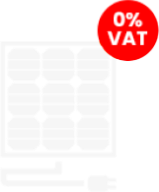






Complete our quick online questionnaire to get a solar panel and battery storage quote to suit your home.





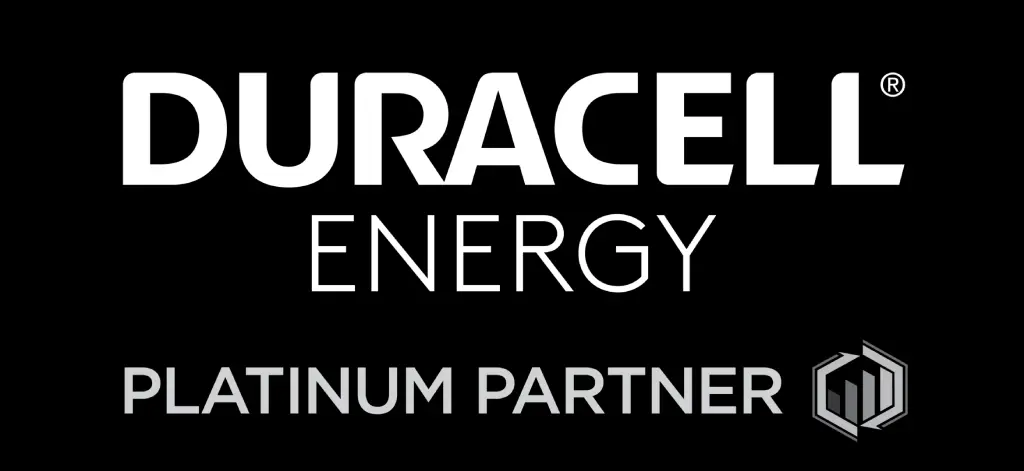




Posted onTrustindex verifies that the original source of the review is Google. The whole process was incredibly smooth - from registration and quotation to installation and follow-up. Their pricing is very competitive, and they take care of everything, including DNO submission, MCS certification, and paperwork for SEG. Installation was carried out with care and professionalism. The workmanship is excellent, and the long warranties give real peace of mind. If you're considering solar, I’d highly recommend UPS Solar for a hassle-free experience.Posted onTrustindex verifies that the original source of the review is Google. What a fantastic service and company, can't rate UPS Solar highly enough. We were contacted by our local council regarding a group solar power installation procurement, the council would do the hard yards finding the best company and, if we wanted to proceed, would put us in contact with them. Almost 1 month to the day we were told UPS Solar were the company we now have a shiny solar panels and battery installed. The communication has been top drawer from the survey to the proposal and the install, UPS Solar took the time to go through any questions or concerns. The scaffolding was erected and the install team arrived a few days later. They started around 0800 and by lunchtime everything was sorted, power flowing and rubbish taken away. UPS Solar then sent through instructions for connecting up to the app to see how everything is working and then a few days later all the certs were emailed across. The day after install the scaffold company arrived and removed the scaffolding. Super efficient. As you are probably aware by now, I can't rate UPS Solar highly enough, great company and seriously know what they are doing. You won't go far wrong.Posted onTrustindex verifies that the original source of the review is Google. Good overall experience. System was installed professionally and cleanly. The only slight niggle was a lack of notice for the scaffolders turning up which didn't help with planning, but that's a minor gripe.Posted onTrustindex verifies that the original source of the review is Google. UPS fitted a replacement Solar inverter for me. Great response to get a good and competitive replacement and a speedy install. They even set up my phone to monitor the system. Excellent service.Posted onTrustindex verifies that the original source of the review is Google. Highly recommend them.I asked few quotes from companies then compared them and their offer was the better with 17 panels and 15kw battery.They were very helpful from the beggining till the end.They were on time with scaffold and instalation too.Made professional job no mess,cleaned up after they finished.Explained everything if I had any question during instalation.The system works better like we expected.Posted onTrustindex verifies that the original source of the review is Google. i had a great experience Price was great alot of other company tried to overcharge for same system Service over the phone is great they answer all your questions The dno process was really fast The installers did a really good and tidy job covered and hide the cables everything looks nice and presentable Great after sales all documents come through fast and they monitor your sistem for any issues after install They have all the certificate for you to sell your energy after having a install from them and they provide with a good warranty So no complainsPosted onTrustindex verifies that the original source of the review is Google. UPS SLOAR INSTALLATION TEAM WAS VERY PROFESSIONAL AND HAVE DONE A FANTASTIC JOB! Everything was explained at each step. Phil and Martin are very knowledgable.Posted onTrustindex verifies that the original source of the review is Google. A very professional and efficient team. We were contacted by Alan who provided an initial quote, and was very informative and patient with my many questions. After some research we found the pricing very competitive, but we found them far more helpful and responsive than others we had contacted. The whole team we have dealt with we helpful and efficient. The whole job was completed from initial contact to finish in a little over a month and that was with some delays on our part. I cannot recommend them enough. Super service. Thank you all at UPS.Posted onTrustindex verifies that the original source of the review is Google. Excellent Company to deal with!! No pushy Sales people harassing with last minute deals or discounts The original survey and quote was done via Satellite imagery. When we expressed an interest a surveyor called to check the positioning of the panels of equipment. Ha also suggested we install a Water heater boost which diverts spare Solar power to the immersion heater. With the bright weather not only has the Solar met all our needs but additionally we have sold some back to the grid. The installation team were friendly efficient and very competent.fitted 3 batteries and 12 panels in the day. Scaffolding was removed immediatelyPosted onTrustindex verifies that the original source of the review is Google. UPS Solar have dealt with us in a most professional manner. From the initial contact in obtaining a proposal and the presentation of it , including price, to the arrangements made after accepting the order. The installation of the scaffolding and panels on the roof, battery with inverter and wired connections. were carried out on the days arranged. All the work was neat and correct with debris cleared at the end. Paperwork has been forwarded within days. All people involved have been efficient and most friendly and helpful. I would have no hesitation in recommending this company for works in future.
View all our latest projects to get a glimpse of our dedicated work for our valuable customers.
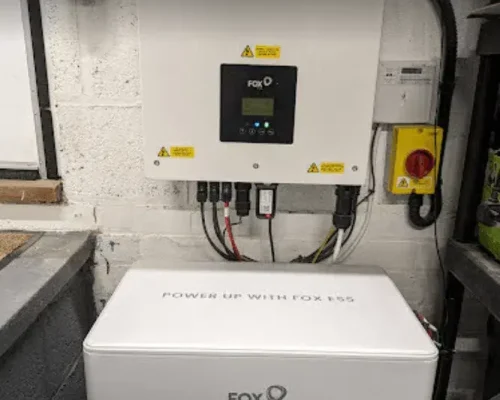
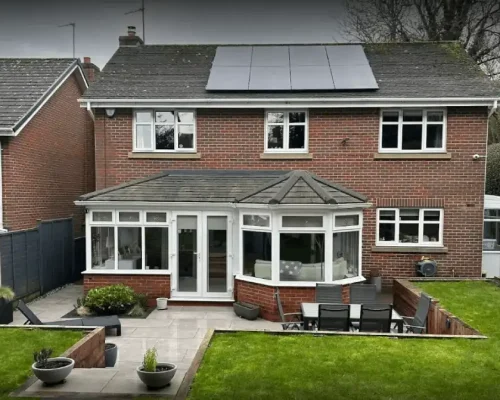
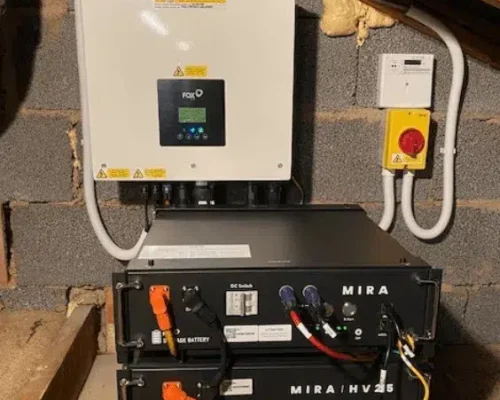
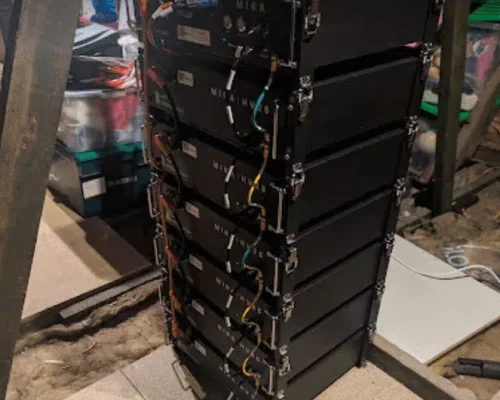
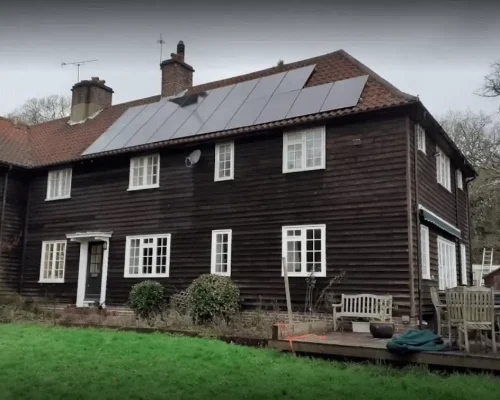
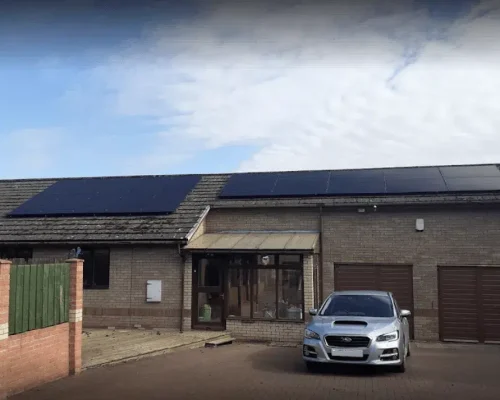
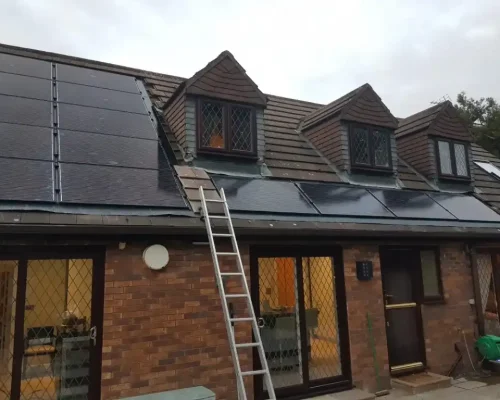
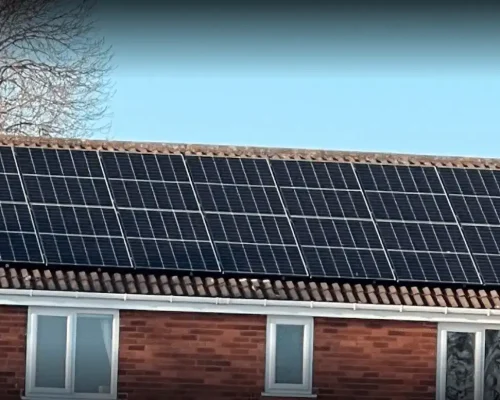
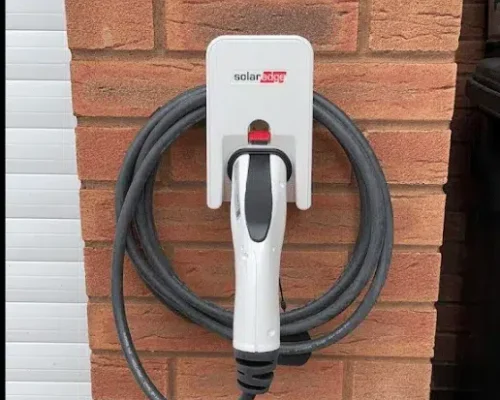
The photovoltaic effect is what’s known as a thermodynamic process. Solar panels directly convert sunlight into electricity and are formed of photovoltaic cells, which are usually made of silicon. When sunlight strikes the cells, the photons from the sunlight are absorbed by the atoms in the silicon material. This absorption excites electrons in the silicon, causing them to move and create an electric current. The electric current is then captured and can be used to power electrical devices or sent to the grid for distribution.
The cost of solar panels can vary significantly depending on factors such as the size of the system and your specific energy requirements. For a more accurate estimate tailored to your needs, we recommend completing our quick remote survey to receive detailed pricing information.
The cost of solar panels depends on your energy usage and roof space. A typical 4kW system, consisting of 10-16 panels, is usually the most cost-effective option for homes. Commercial properties, with higher energy needs and more roof space, generally require more panels. Smaller businesses might need a few dozen panels, while larger operations could need significantly more. To get an accurate, no-obligation quote tailored to your needs, complete our free survey.
UPS Solar panels typically last 25-30 years, retaining at least 80% of their power output. With good quality, favorable conditions, and proper maintenance, their lifespan can be even longer. UPS Solar offers a 25-year manufacturer warranty and a 25-year performance guarantee to protect your investment.
The energy a solar panel system produces depends on its size, panel efficiency, and sunlight exposure. In the UK, a 4kW system typically generates 3,400 to 4,200 kWh annually, enough to cover an average household’s electricity needs. Actual output can vary based on installation conditions and weather. For a precise estimate, request a free quote survey.
South-facing roofs (south-east, south, south-west) are the most efficient for solar panels, but flat roofs and ground-mounted systems are also viable. It’s crucial that the installation area has minimal shading and gets sunlight most of the day. For a detailed assessment of your home’s solar suitability and options, request a free quote survey.
Solar panel batteries are used for storing the electricity from solar panels, which get the energy from the sun directly. Solar panel batteries can be used to give power to your house or your workplace in the form of electricity, when the weather is cloudier, or at night. Some of them can be used as well to charge by charging electric cars, which increases their usefulness and is practical.
Cleaning your solar panels regularly maximises their efficiency by ensuring they absorb the most sunlight. Dust, dirt, and bird droppings can reduce their effectiveness. Panels typically need cleaning once a week. In dry areas, manual cleaning is required, while in rainier regions, natural cleaning is often sufficient.
Battery storage maximises the benefits of commercial solar panels by storing excess energy for use during peak times, at night, or on cloudy days. This boosts energy independence, reduces reliance on the grid, and lowers costs by avoiding peak utility rates. Additionally, battery storage provides backup power during outages, ensuring continuous operations.
Yes, solar panels generate electricity in cloudy weather. They continue generating electricity even when the sun isn’t directly visible.